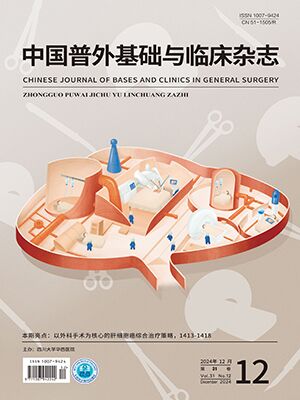| 1. |
Sung H, Ferlay J, Siegel RL, et al. Global cancer statistics 2020: GLOBOCAN estimates of incidence and mortality worldwide for 36 cancers in 185 countries. CA Cancer J Clin, 2021, 71(3): 209-249.
|
| 2. |
《原发性肝癌诊疗规范(2019年版)》编写专家委员会. 原发性肝癌诊疗规范(2019年版). 中国临床医学, 2020, 27(1): 140-156.
|
| 3. |
中华人民共和国国家卫生健康委员会医政医管局. 原发性肝癌诊疗规范(2019年版). 传染病信息, 2020, 33(6): 481-500.
|
| 4. |
Zhang X, Li C, Wen T, et al. Outcomes of salvage liver transplantation and re-resection/radiofrequency ablation for intrahepatic recurrent hepatocellular carcinoma: a new surgical strategy based on recurrence pattern. Dig Dis Sci, 2018, 63(2): 502-514.
|
| 5. |
Zhang X, Li C, Wen T, et al. Treatment for intrahepatic recurrence after curative resection of hepatocellular carcinoma: salvage liver transplantation or re-resection/radiofrequency ablation? A retrospective cohort study. Int J Surg, 2017, 46: 178-185.
|
| 6. |
Liang HH, Chen MS, Peng ZW, et al. Percutaneous radiofrequency ablation versus repeat hepatectomy for recurrent hepatocellular carcinoma: a retrospective study. Ann Surg Oncol, 2008, 15(12): 3484-3493.
|
| 7. |
Wang K, Liu G, Li J, et al. Early intrahepatic recurrence of hepatocellular carcinoma after hepatectomy treated withre-hepatectomy, ablation or chemoembolization: a prospective cohort study. Eur J Surg Oncol, 2015, 41(2): 236-242.
|
| 8. |
Song KD, Lim HK, Rhim H, et al. Repeated hepatic resection versus radiofrequency ablation for recurrent hepatocellular carcinoma after hepatic resection: a propensity score matching study. Radiology, 2015, 275(2): 599-608.
|
| 9. |
Poon RT, Fan ST, Lo CM, et al. Intrahepatic recurrence after curative resection of hepatocellular carcinoma: long-term results of treatment and prognostic factors. Ann Surg, 1999, 229(2): 216-222.
|
| 10. |
Cheng YC, Chen TW, Fan HL, et al. Transarterial chemoembolization for intrahepatic multiple recurrent HCC after liver resection or transplantation. Ann Transplant, 2014, 19: 309-316.
|
| 11. |
Zhang X, Li C, Wen T, et al. Appropriate treatment strategies for intrahepatic recurrence after curative resection of hepatocellular carcinoma initially within the Milan criteria: according to the recurrence pattern. Eur J Gastroenterol Hepatol, 2015, 27(8): 933-940.
|
| 12. |
Jin YJ, Lee JW, Lee OH, et al. Transarterial chemoembolization versus surgery/radiofrequency ablation for recurrent hepatocellular carcinoma with or without microvascular invasion. J Gastroenterol Hepatol, 2014, 29(5): 1056-1064.
|
| 13. |
Sun Y, Wu L, Zhong Y, et al. Single-cell landscape of the ecosystem in early-relapse hepatocellular carcinoma. Cell, 2021, 184(2): 404-421. e416. doi: 10.1016/j.cell.2020.11.041.
|
| 14. |
Hassan EA, Ahmed EH, Nafee AM, et al. Regulatory T cells, IL10 and IL6 in HCV related hepatocellular carcinoma after transarterial chemoembolization (TACE). Egypt J Immunol, 2019, 26(1): 69-78.
|
| 15. |
Kinter AL, Godbout EJ, McNally JP, et al. The common gamma-chain cytokines IL-2, IL-7, IL-15, and IL-21 induce the expression of programmed death-1 and its ligands. J Immunol, 2008, 181(10): 6738-6746.
|
| 16. |
张晓赟, 朱心睿, 彭伟, 等. 经肝动脉化疗栓塞+仑伐替尼+PD-1单抗在中晚期不可切除肝癌转化切除中的安全性和有效性的前瞻性队列研究: 初步报告. 中国普外基础与临床杂志, 2022, 29(1): 39-45.
|
| 17. |
Zhao Y, Cai G, Zhou L, et al. Transarterial chemoembolization in hepatocellular carcinoma with vascular invasion or extrahepatic metastasis: a systematic review. Asia Pac J Clin Oncol, 2013, 9(4): 357-364.
|
| 18. |
Yao W, Xue M, Lu M, et al. Diffuse recurrence of hepatocellular carcinoma after liver resection: transarterial chemoembolization (TACE) combined with sorafenib versus TACE monotherapy. Front Oncol, 2020, 10: 574668. doi: 10.3389/fonc.2020.574668.
|




